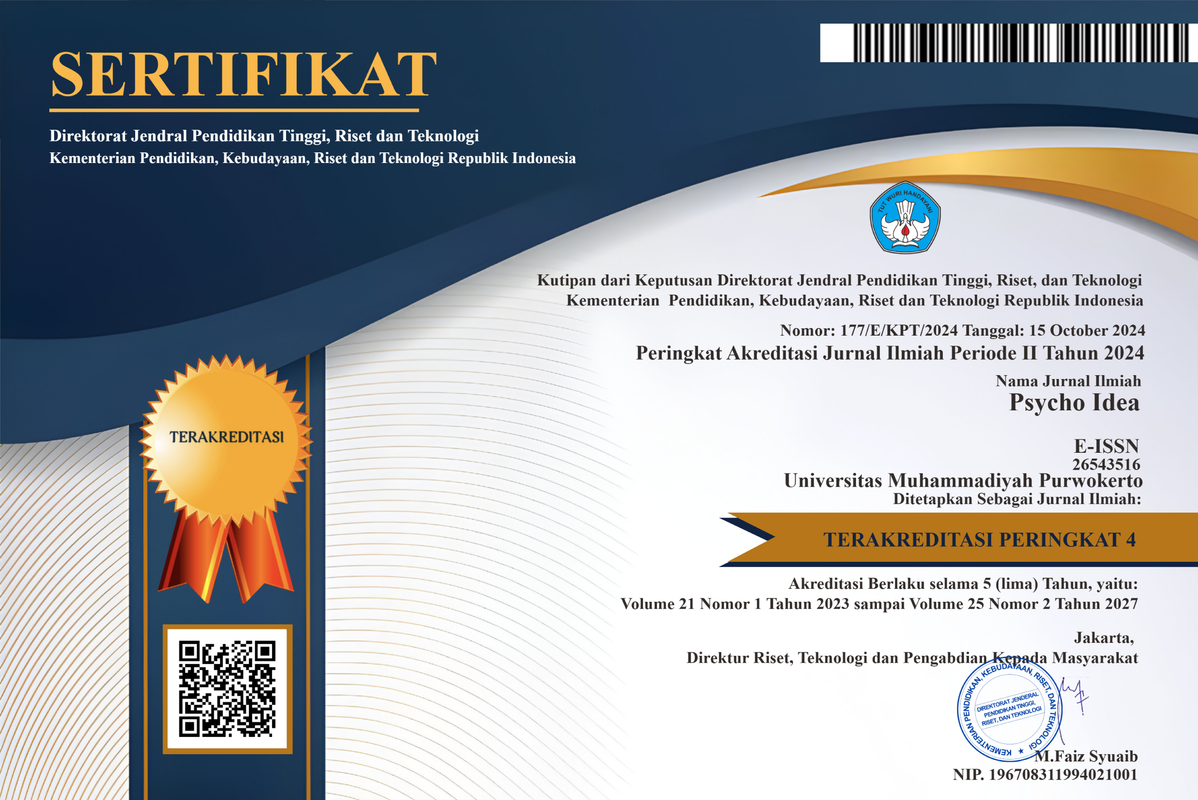PERILAKU MEMAAFKAN PADA KORBAN BULLYING FISIK DI SEKOLAH MENENGAH PERTAMA
DOI:
https://doi.org/10.30595/psychoidea.v14i1.1575Abstract
Penelitian ini bertujuan untuk megetahui proses memaafkan yang dialami oleh korban bullying fisik di SMP. Penelitian ini terdiri dari dua orang yang pernah menjadi korban bullying fiik. Penelitian ini merupakan penelitian kualitatif dengan teknik pengumpulan data yaitu observasi, wawancara, dan dokumentasi. Penelitian ini berfokus pada bagaimana proses memaafkan pada korban bullying. Analisis data dalam penelitian ini menggunakan analisis model interaktif yaitu setelah data berhasil dikumpulkan setalah itu direduksi dan disajikan dalam bentuk tabel yang berisi hasil dari pengumpulan data, selanjutnya di tarik kesimpulan. Hasil penelitian ini menunjukkan bahwa proses korban bullying yang tidak memaafkan adalah pertama marah kepada pelaku, kedua mencoba meredakan kebenciannya dengan begumam sendiri, ketiga memasrahkannya kepada Allah, keempat tidak ingin memaafkan pelaku karena tindakan pelaku. Sedangkan proses korban bullying yang memaafkan pertama merasa sedih dan memasrahkannya kepada Allah, tetap fokus pada sekolahnya dan mamaafkan pelaku walaupun tidak ingin mengenal pelaku lagi. Faktor yang menghambat untuk memaafkan karena tindakan pelaku sangat kasar, dan factor pendorong karena tidak ingin membebebani pikiran dengan dendam serta ada dukungan orang terdekat. Kata kunci : Memaafkan, Bullying Fisik, SekolahReferences
Ahmed, E. and Braithwaite, V. (2006). Forgiveness, reconciliation, and shame: Three key variables in reducing school bullying, Journal of Social Issues, [Special issue: Restorative Justice and Civil Society: Emerging Practice, Theory and Evidence, edited by B. Morrison & E. Ahmed], 62(2). 347- 370.
Bungin, M. B. (2007).Penelitian Kualitatif. Edisi Kedua. Jakarta: Kencana.
Egan, L. A & Todorov, N. (2009). Forgiveness As a Coping Strategy to Allow School Students to Deal with The Effect of Being Bullied: Theoritical and Empirical discussion. Journal of Social and Clinical Psychology. 28. 198-222.
Freedman, S. R & Enright, R. D, (1996). Forgiveness as an Intervention Goal With Incest Survivors. Journal of Consulting and Clinical Psychology, 64, (5), 983-992.
Hargrave, T. D. (2008). Forgiveness and reconciliation after infidelity. Family Therapy Magazine, March/April, 30-33.
Indra.A. (2011).Mendikbud: UN Tak Bertentangan dengan UU. Diakses Pada 20 Agustus 2016 pukul 21.59 WIB http://edukasi.kompas.com/read/2011/08/11/10585711/Mendiknas.Homeschooling.Itu.Lebih.Baik.
Lewis, B.S (1984), Forgive & Forget, New York : Pocket Book, Simon & Schuter Inc.
McCullough, M.E, Fincham, F.D and Tsang, J. (2003). Forgivenes, Forbearance and Time : The Temporal Unfolding of Transgression-Related Interpersonal Motivations. Journal of Personality and Social Psychology, 84 (3), 540-557
Sugiyono. (2009). Memahami Penelitian Kualitatif. CV. Alfabeta: Bandung
Sugiyono, (2011). Metode Penelitian Kuantitatif Kualitatif dan R&D. Albeta : Bandung
Siswati & Widayanti, C.G (2009). Fenomena Bullying Di Sekolah Dasar Negeri Di Semarang: Sebuah Studi Deskriptif. Jurnal Psikologi. Undip, 5. (2).
Downloads
Published
Issue
Section
License
Authors published in this journal agree to the following terms:
- The copyright of each article is retained by the author (s) without restrictions
- The journal allows the author(s) to retain publishing rights without restrictions
- The author grants the journal the first publication rights with the work simultaneously licensed under the Creative Commons Attribution License, allowing others to share the work with an acknowledgment of authorship and the initial publication in this journal.
- Authors may enter into separate additional contractual agreements for the non-exclusive distribution of published journal versions of the work (for example, posting them to institutional repositories or publishing them in a book), with acknowledgment of their initial publication in this journal
- Authors are permitted and encouraged to post their work online (For example in the Institutional Repository or on their website) before and during the submission process, as this can lead to productive exchanges, as well as earlier and larger citations of published work
- Articles and all related material published are distributed under a Creative Commons Attribution-4.0 International Public License (CC - BY 4.0).
License
Psycho Idea is licensed under a Creative Commons Attribution- 4.0 International Public License (CC - BY 4.0).
You are free to :
Share — copy and redistribute the material in any medium or format
Adapt — remix, transform, and build upon the material for any purpose, even commercially











